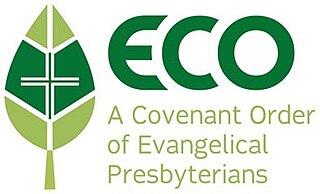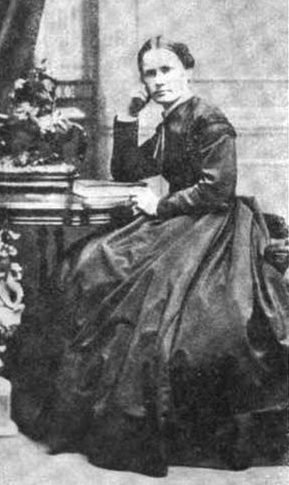Related Research Articles

The Presbyterian Church (USA), abbreviated PCUSA, is a mainline Protestant denomination in the United States. It is the largest Presbyterian denomination in the country, known for its liberal stance on doctrine and its ordaining of women and members of the LGBT community as elders and ministers. The Presbyterian Church (USA) was established with the 1983 merger of the Presbyterian Church in the United States, whose churches were located in the Southern and border states, with the United Presbyterian Church in the United States of America, whose congregations could be found in every state.
Presbyterianpolity is a method of church governance typified by the rule of assemblies of presbyters, or elders. Each local church is governed by a body of elected elders usually called the session, though other terms, such as church board, may apply. Groups of local churches are governed by a higher assembly of elders known as the presbytery or classis; presbyteries can be grouped into a synod, and presbyteries and synods nationwide often join together in a general assembly. Responsibility for conduct of church services is reserved to an ordained minister or pastor known as a teaching elder, or a minister of the word and sacrament.

The Presbyterian Church in America (PCA) is the second-largest Presbyterian church body, behind the Presbyterian Church (USA), and the largest conservative Calvinist denomination in the United States. The PCA is Reformed in theology and presbyterian in government.

The Cumberland Presbyterian Church is a Presbyterian denomination spawned by the Second Great Awakening. In 2019, it had 65,087 members and 673 congregations, of which 51 were located outside of the United States. The word Cumberland comes from the Cumberland River valley where the church was founded.

The Presbyterian Church in the United States was a Protestant denomination in the Southern and border states of the United States that existed from 1861 to 1983. That year, it merged with the United Presbyterian Church in the United States of America (UPCUSA) to form the Presbyterian Church (USA).

The Evangelical Presbyterian Church (EPC) is an American church body holding to presbyterian governance and Reformed theology. It is a moderate Calvinist denomination. It is most distinctive for its approach to the way it balances certain liberties across congregations on "non-essential" doctrines, such as egalitarianism /complementarianism in marriage or the ordination of women, alongside an affirmation of core "essential" doctrinal standards.

The Presbyterian Church in the United States of America (PCUSA) was a Presbyterian denomination existing from 1789 to 1958. In that year, the PCUSA merged with the United Presbyterian Church of North America. The new church was named the United Presbyterian Church in the United States of America. It was a predecessor to the contemporary Presbyterian Church (USA).
The New Castle Presbytery is a presbytery of the Presbyterian Church (USA). Its geographic area is the entire state of Delaware and the Maryland Eastern Shore. In 2022, it reported 49 congregations, 108 ministers, and 5,736 members.
The Cumberland Presbyterian Church in America is a historically African-American denomination which developed from the Cumberland Presbyterian Church in 1874.

John Monteith was a United States Presbyterian minister, educator, abolitionist and a founding father of the University of Michigan, formerly known as University of Michigania or the Catholepistemiad. Monteith served as president of the university from 1817 through 1821. During his five years in Detroit, he also served as the city's first librarian, and founded the first Protestant church in Detroit and the first Presbyterian church in what is now the State of Michigan.

The Woodward Avenue Presbyterian Church is a church located at 8501 Woodward Avenue in Detroit, Michigan. Built in 1911 in the Gothic Revival style, the architect was Sidney Badgley. It was used for some time as the Abyssinia Church of God in Christ. The building was listed on the National Register of Historic Places in 1982.
The Ecumenical Theological Seminary is a private seminary in Detroit, Michigan. Founded in 1980 as the Ecumenical Theological Center, the seminary offers graduate degrees and certificates in religious studies. It is housed in a building built in 1889 to house the First Presbyterian Church; the seminary began leasing the building in 1992 and was donated the building, lands, and endowment in 2002.

The Park United Presbyterian Church is located at 14 Cortland Street in Highland Park, Michigan. It was built in 1910 as the Highland Park Presbyterian Church, listed on the National Register of Historic Places in 1982, and designated a Michigan State Historic Site in 1983. It is a member of The Presbyterian Church (U.S.A.), and continues to offer services.

The 1998 Michigan Wolverines football team was an American football team that represented the University of Michigan as a member of the Big Ten Conference during the 1998 NCAA Division I-A football season. In their fourth year under head coach Lloyd Carr, the Wolverines compiled a 10–3 record, finished in a three-way tie for the Big Ten championship, and were ranked No. 12 in the final Associated Press and USA Today/ESPN coaches' polls. They outscored opponents by a total of 359 to 235, ranking 42nd nationally in scoring offense and 14th in scoring defense.

The 1955 Michigan Wolverines football team was an American football team that represented the University of Michigan in the 1955 Big Ten Conference football season. In their eighth season under head coach Bennie Oosterbaan, the Wolverines finished in third place in the Big Ten Conference, compiled a 7–2 record, and were ranked No. 12 and No. 13 in the final AP and UPI Polls.

Sashabaw Presbyterian Church is a historic church located at 5331 Maybee Road near Clarkston, Michigan. The church is one of the oldest in the Detroit Presbytery and has served congregations for nearly 150 years. It was designated a Michigan State Historic Site in 1964 and listed on the National Register of Historic Places in 1980.

ECO: A Covenant Order of Evangelical Presbyterians is an evangelical Presbyterian denomination in the United States. As a Presbyterian church, ECO adheres to Reformed theology and Presbyterian polity. It was established in 2012 by former congregations and members of the Presbyterian Church (USA), abbreviated PC(USA). Denominational disputes over theology—particularly ordination of practicing homosexuals as pastors and gay marriage—and bureaucracy led to the founding of ECO. In 2018, ECO has over 383 congregations, 103,425 covenant partners and over 500 pastors. ECO churches are egalitarian in beliefs and ordain women as pastors and elders.
Events from the year 1885 in Michigan.

Nancy Jane Dean, often referred to as Jennie Dean or N. J. Dean, was an American educator and Presbyterian missionary serving Assyrian Christians in Qajar Iran. She served as the head of Fiske Seminary, a girls' boarding school in Urmia, West Azerbaijan Province.
References
- ↑ "PC(USA) Research Services - Church Trends". church-trends.pcusa.org. Retrieved 2024-07-30.